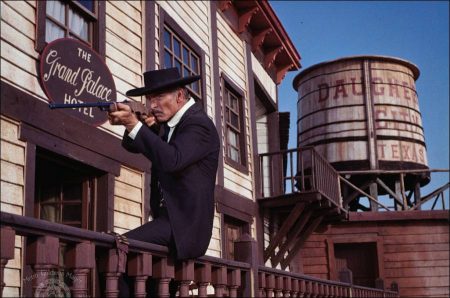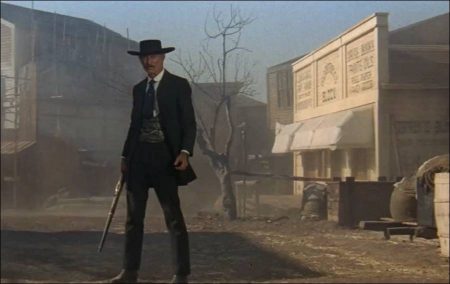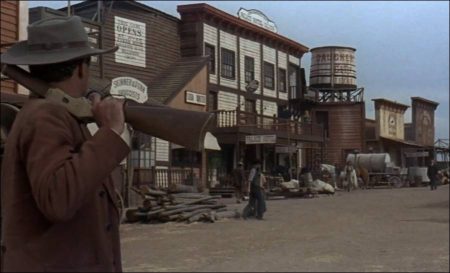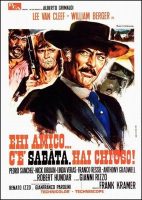Taglines: Ehi amico… c’è Sabata. Hai chiuso!
Sabata accidentally witnesses a bank robbery, in which a load of army money is stolen. He kills the robbers and takes the money back into town, but then discovers that the people behind the robbery, are three respected citizens, the judge, the banker and a rancher called Stengel.
The most dangerous of the three, a homosexual sadist who has a private room in which he executes people. Sabata is assisted by a foul-mouthed town drunk called Garrincha, and an acrobat by the name of Alley Cat. An old acquaintance of him, a red-headed womanizer called Banjo (who hides his rifle in his instrument), is the man in the middle, who has his eyes on the money too.
Sabata did even better at the box-office than Pray for your Death and also beat the second Sartana movie, I am Sartana, your Angel of Death, released the same year, and directed by Giuliano Carnimeo. It also did very well abroad. I remember watching the movie in a Dutch cinema filled with teenagers, who (like those Italian teenagers watching Five for Hell) seemed to have the time of their life. Luckily it was dubbed in English and subtitled in Dutch, so we could understand every word of it.
A few things might have helped the movie on the international market. The first Sartana movie had only received a limited release (in Holland it only got some late night showings) and the Trinity movies were still in the pipeline. Furthermore the tongue-in-cheek approach had made rating boards more lenient. It got a ’14 certificate’ while so far most spaghetti westerns had received an ’18 rating’, preventing younger audiences from watching them. As a result, to many Sabata must have looked more original than it really was.
Sabata (Italian: Ehi amico… c’è Sabata. Hai chiuso!, lit. “Hey buddy… that’s Sabata. You’re finished!”), is a 1969 Italian Spaghetti Western directed by Gianfranco Parolini. It is the first film in The Sabata Trilogy by Parolini, and stars Lee Van Cleef as the title character. Parolini had previously had a major success with the first Sartana spaghetti western If You Meet Sartana Pray for Your Death (1968), but the sequels were given to Giuliano Carnimeo. Producer Alberto Grimaldi contacted Parolini for a similar series of Sabata.
Cast and Characters
Lee Van Cleef as Sabata, A gunman of almost superhuman accuracy and questionable morals, he solves the majority of his problems with a combination of superior firepower and accuracy. His weapon of choice is a peculiar four-barreled derringer, alongside a rifle with an extended barrel.
William Berger as Banjo. the only man in the film who is almost on par with Sabata gunfighting-wise. Hiding out in the town after some unnamed trouble in Denver, he seems to know everything that is going on in the town, and tries to make money off both Sabata and Stengel. He carries a banjo everywhere.
Ignazio Spalla (as Pedro Sanchez) as Carrincha, a fat alcoholic Civil War veteran who hurls knives at people between rants about the dullness of civilian life and the worthlessness of medals. The majority of his sentences end in insane laughter.
Aldo Canti (as Nick Jordan) as Indio / Alley Cat, Carrincha’s only “friend”, Alley Cat is a silent Indian who performs amazing acrobatics and can escape any pursuer.
Linda Veras as Jane, a saloon girl who is attracted to Banjo.
Franco Ressel as Stengel, the effeminate villain of the story, he engineered the robbery that set the whole plot in motion. Very smug in the belief that he is superior to the rest of humanity, he kills people with a dart gun concealed in a cane.
Antonio Gradoli (as Anthony Gradwell) as Ferguson, one of Stengel’s increasingly reluctant partners in crime.
Claudio Undari (as Robert Hundar) as Oswald
Gianni Rizzo as Judge O’Hara, another of Stengel’s increasingly reluctant partners in crime.
Sabata (1969)
Directed by: Gianfranco Parolini
Starring: Lee Van Cleef, William Berger, Ignazio Spalla, Aldo Canti, Franco Ressel, Antonio Gradoli, Linda Veras, Robert Hundar, Gianni Rizzo, Spartaco Conversi, Marco Zuanelli, Luciano Pigozzi, Andrea Aureli, Franco Marletta
Screenplay by: Renato Izzo, Gianfranco Parolini
Production Design by: Carlo Simi
Cinematography by: Alessando Mancori
Film Editing by: Edmondo Lozzi
Costume Design by: Carlo Simi
Set Decoration by: Claudio De Santis
Music by: Marcello Giombini
MPAA Rating: PG-13 for western violence and some sexual situations.
Distributed by: United Artists
Release Date: September 16, 1969 (Italy), September 2, 1970
Views: 254



